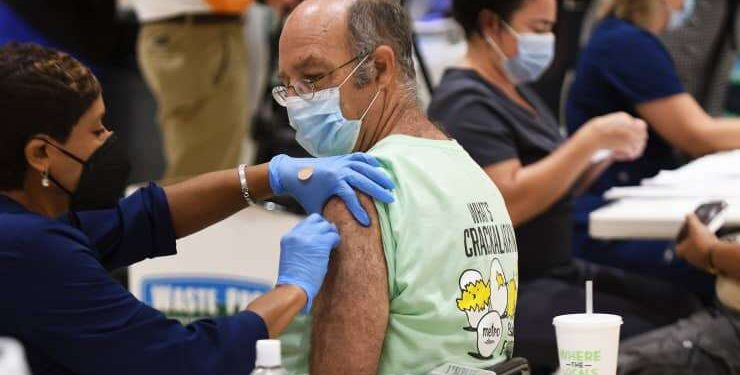Scientists sharply criticized the Biden administration’s push to widely distribute Covid-19 vaccine booster shots in the U.S. next month, saying the data provided by federal health officials this week wasn’t compelling enough to recommend third shots to most of the American population right now.
U.S. health leaders say they are preparing to offer booster shots to all eligible Americans beginning the week of Sept. 20. The plan, outlined Wednesday by CDC Director Dr. Rochelle Walensky, acting FDA Commissioner Dr. Janet Woodcock, White House chief medical advisor Dr. Anthony Fauci and other health officials, calls for a third dose eight months after people get their second shot of either the Pfizer or Moderna vaccines.
They cited three new studies, released by the Centers for Disease Control and Prevention, that showed their protection against covid diminished over several months. One study in New York from May 3 through July 25 showed that vaccine protection against infection dropped from around 92% to 80%. Another study by the Mayo Clinic showed that Pfizer’s vaccine efficacy fell from around 76% to 42% while Moderna’s declined from 86% to 76%.
“Taken together, you can see that while the exact percentage of vaccine effectiveness over time differs depending on the cohort and settings study, the data consistently demonstrate a reduction of vaccine effectiveness against infection over time,” Walensky told reporters during a White House Covid press briefing.
But scientists and other health experts said the data they cited wasn’t compelling, characterizing the administration’s push for boosters as premature. While the data did suggest there was a reduction in protection against mild and moderate disease, the two-dose vaccines still held up well against severe disease and hospitalizations, scientists said.
For example, the New York study released by the CDC showed there were 9,675 infections among fully vaccinated adults, compared with 38,505 infections among unvaccinated adults during the period examined. Among the fully vaccinated people who were infected, 1,271 were hospitalized, accounting for roughly 15% of all Covid hospitalizations.
“People are still highly protected against severe disease, hospitalization, and death. This is what vaccines are supposed to do,” said Dr. Anna Durbin, a vaccine researcher at Johns Hopkins University. “If we start seeing significant upticks of more severe disease and hospitalizations in vaccinated people, that would be a signal to consider boosters.”
The body’s immune system is complex, Durbin said. While the presence of antibodies induced by the vaccine may decline, resulting in a rise in breakthrough infections, the body has other mechanisms, like T cells, that may protect someone from getting seriously sick, she said.
“The data are showing that yes, we are seeing breakthrough infections but, the infections are mild or moderate colds,” she said.
To be sure, federal health officials said the vaccines are still holding up against severe disease over time, even as their ability to prevent infections declines. They said, based on their latest assessment, “the current protection against severe disease, hospitalization, and death could diminish in the months ahead, especially among those who are at higher risk or were vaccinated during the earlier phases of the vaccination rollout.”
There are some groups in the U.S. who would benefit from a third dose right now, according to Dr. Archana Chatterjee, a member of the Food and Drug Administration’s Vaccines and Related Biological Products Advisory Committee.
Data does support the need for booster doses primarily among those who are moderate to severely immunocompromised, Chatterjee said. Federal health officials on Friday approved giving booster shots to such people – which include cancer and HIV patients and people who have had organ transplants – after data suggested they don’t produce an adequate immune response after getting two doses. As of now, “breakthrough infections in the general public tend to be asymptomatic or mild,” she said. [CNBC]















